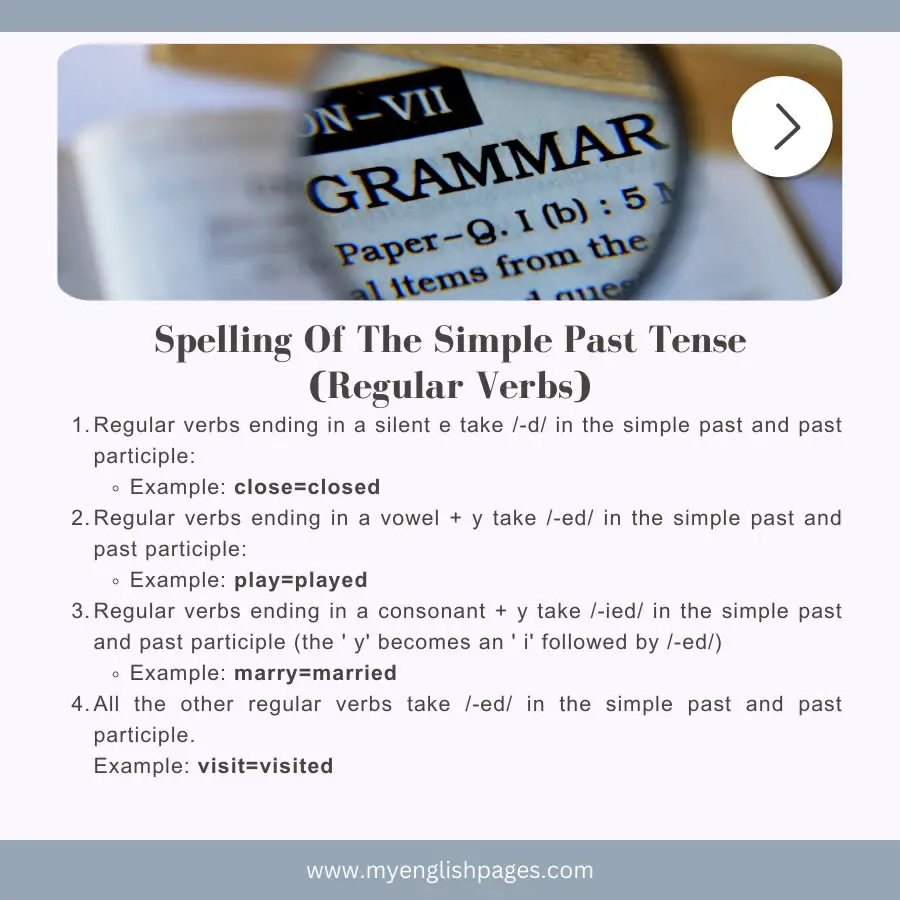Introduction

In this grammar lesson, we will explore the spelling of the (-ed forms) simple past form, also known as the -ed form. Before we delve into the rules, let’s take a look at some examples to understand how regular verbs are spelled in the simple past tense.
Simple Past Tense Spelling Rules (-Ed Forms)
Before we deal with the spelling rules of the -ed forms of regular verbs in the simple past in more detail, let’s summarize the different cases in the following table:
| Verbs ending in a… | |||
|---|---|---|---|
| 1. silent e | 2. vowel + y | 3. consonant + y | 4. other forms |
| close = closed die = died phone = phoned | play = played destroy = destroyed show = showed | marry = married carry = carried study = studied | visit = visited miss = missed watch = watched finish = finished fix = fixed buzz = buzzed |
Rules Of The Simple Past Tense Forms:
Here are the rules:
- Regular verbs ending in a silent e take /-d/ in the simple past and past participle:
Example:
close=closed - Regular verbs ending in a vowel + y take /-ed/ in the simple past and past participle:
Example:
play=played - Regular verbs ending in a consonant + y take /-ied/ in the simple past and past participle (the ‘ y‘ becomes an ‘ i’ followed by /-ed/)
Example:
marry=married - All the other regular verbs take /-ed/ in the simple past and past participle.
Example:
visit=visited

Special Cases Of The -Ed Forms:
Follow these rules when there is a consonant after a vowel (stop, ban, open, offer…)
- If there is a consonant after a stressed vowel at the end of the word, double the consonant
stop – stopped
ban – banned
swap – swapped - If the vowel is not stressed, we do not double it:
open – opened (Here the stress is on ‘o’, not the ‘e’.)
offer – offered ( Here the stress is on ‘o’, not the ‘e’.)
Special Note For British English
In British English, we double the last ‘l‘ of words like travel, cancel, and level even though the last vowel is not stressed. Here are some examples:
- travel – travelled
- cancel – cancelled
- level – levelled
- marvel – marvelled
Examples:
Here are examples with verbs ending in “l” in both British and American spellings:
- British: He travelled to London for a business meeting. American: He traveled to New York for a business meeting.
- British: The event was cancelled due to unforeseen circumstances. American: The event was canceled due to unforeseen circumstances.
- British: She levelled the playing field to ensure fairness. American: She leveled the playing field to ensure fairness.
- British: The magician skillfully labelled each magic potion. American: The magician skillfully labeled each magic potion.
- British: The team fuelled up before the championship game. American: The team fueled up before the championship game.
Example Sentences of -Ed Forms
Here are 10 example sentences with verbs in the simple past tense (regular):
- Yesterday, I watched a fascinating documentary about wildlife.
- The children played in the park until the sun went down.
- Sarah finished reading the novel in just two days.
- The baker baked a delicious chocolate cake for the celebration.
- We visited our grandparents during the summer vacation.
- The mechanic quickly fixed the car’s engine problem.
- The students studied diligently for their final exams.
- The mailman delivered the packages to our doorstep this morning.
- Last night, they cleaned the entire house for the party.
- Emily called her friend to share the exciting news.
More on the simple past here.
Related Pages:


